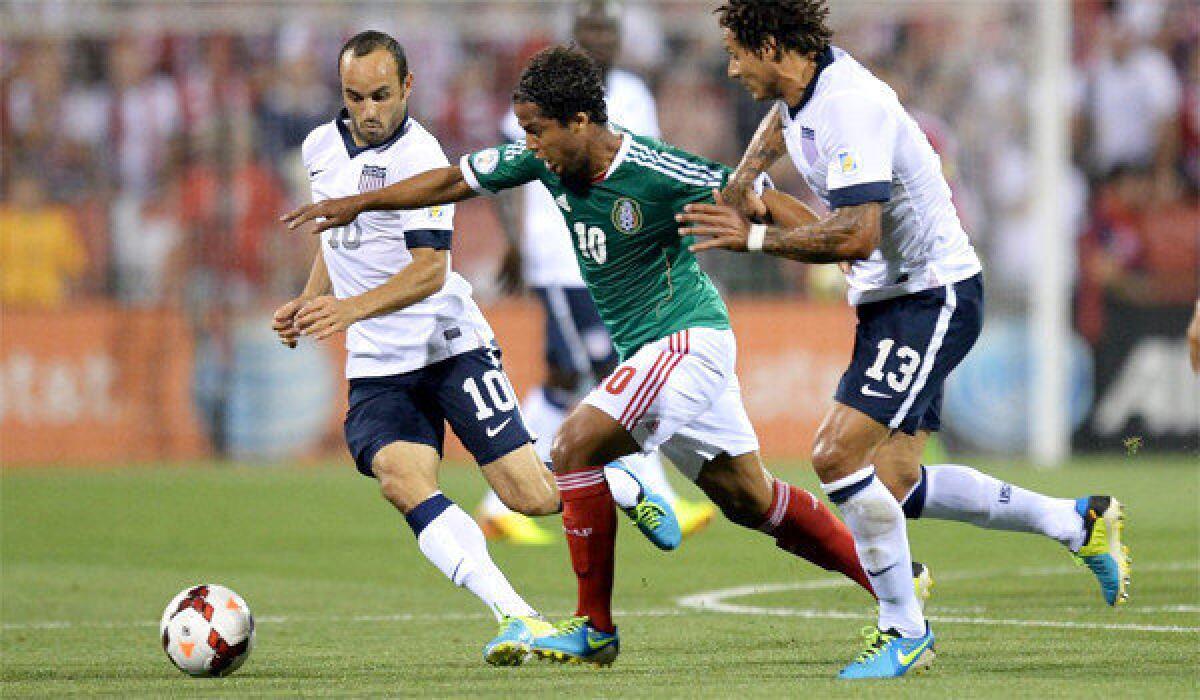U.S. soccer team needs to have patience and calmness leading up to World Cup

- Share via
After 3 1/2 years of planning and preparation, of training and tribulation, most of the World Cup questions that once vexed the U.S. national team have been answered.
The Americans know who they’re playing, when they’re playing and where they’re playing. They even have a pretty good idea who will be playing for them when all that happens six months from now.
So now what?
Well, turns out there’s not much to do but sit and wait.
“You have to be patient,” said Galaxy Coach Bruce Arena, who coached the U.S. in two World Cups.
That could be especially challenging for this U.S. team, which plays Ghana, Portugal and Germany in the first round in Brazil. And it will have to travel more than 9,000 miles in 10 days to do so.
It’s the most challenging and arduous schedule of any World Cup team. But Arena says it’s one the coaches have no choice but to embrace.
“You can’t bring your frustrations on to the players because the players have another job,” he said. “They’re very busy every day. So you can’t be anxious and lay it all on the team.
“But you’ve got to be prepared. You’ve got to maintain contact with the players throughout. “
Arena is speaking from experience. The U.S. had a difficult draw in 2002, Arena’s first World Cup as coach, when it played tournament favorite Portugal and eventual semifinalist South Korea in its first two games. The Americans came away with four points, then beat Mexico in the round of 16 to reach the quarterfinals, becoming the only U.S. team to get that far in a post-war era World Cup.
And Brian McBride, who scored what proved to be the deciding goal in a victory over Portugal, credits Arena for setting a positive tone for that tournament.
“I look back to the 2002 World Cup and that six-month period leading up to it. Any time we got together, he would look at everybody and he would say ‘You know what? I’m telling you we’re going to beat Portugal,’ ” McBride remembers. “And not a person outside of that room probably believed that.
“I guarantee you Bruce did. And 99%, if not all of us, believed that was the case. That’s when you get to focus on the World Cup.”
McBride says he expects current U.S. Coach Juergen Klinsmann, a master motivator who won one World Cup with Germany as a player and coached the country into the semifinals in another, to provide a similar focus when the team gets together for training next month.
An effort to instill that kind of confidence is also why the U.S. will split its winter training camp between the StubHub Center in Carson and its World Cup training base in Sao Paulo, Brazil.
“It’s a great idea,” said McBride, a three-time World Cup veteran who is a studio analyst with Fox Soccer. “You get to have the familiarity with it. Those things, if you’re prepared for them and you know what’s coming, it’s a lot easier to make adjustments for the stuff that you don’t know what’s coming.”
When the players are with their club teams, however, it’s important they focus on anything but the World Cup, says Eric Wynalda, who played in the tournament three times. That’s why Wynalda agrees with Klinsmann that national team players would be better served playing on loan in Europe, where the season runs into May, rather than in Major League Soccer, which doesn’t begin play until March.
“I can tell you that going through it, I remember how many guys were just playing not to get hurt,” Wynalda, another Fox Soccer analyst, said as he watched a UEFA Champions League game from a lounge next to his West Los Angeles studio last week. “Now guys playing in Europe don’t have that option. They have competitive games.
“The problem is that guys that go through it from MLS, it’s too much to ask them to go from sleep to sprint like that. That’s why we haven’t been as competitive as we could have been in World Cups in the past. ... Playing competitive games at 100 mph in May is going to help you.”
As for other worries, such as matchups and travel, Wynalda said “it’s way too early for that stuff.”
Maybe so. But last week, U.S. Soccer showed it’s already thinking ahead to the 2018 World Cup, signing Klinsmann to a four-year contract extension that also makes him the technical director for everything from the youth and academy teams to preparations for the World Cup. Bob Bradley, the man Klinsmann replaced as coach, did not have that luxury when he entered the 2010 World Cup as a lame duck with only weeks left on his contract.
“It really helps us to look a little beyond this upcoming World Cup,” Klinsmann said. “We want to do well there, and we will do well. But for the type of work that we have begun there, we want to show the players, we want to show everybody involved in the game here that there is a plan in place, or there are ideas in place.
“It gives us all of that sense that we are thinking through certain periods and not just now counting down the days until Game 1 starts in Natal in Brazil.”
Twitter: @kbaxter11








